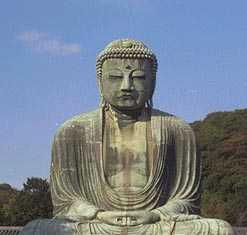

In the Red Corner, he weighs in at approximately 2000 pounds. He stands at 60 feet tall and he is 2700 years old. From India, by way of China, Ladies and Gentlemen....Siddartha Gautama Buddha!
And in the Blue Corner, weighing in at 180 pounds and with an impressive record of wins dating back to 1859, Ladies and Gentlemen, the author of "Origin of the Species", Charles Darwin!
This fight is scheduled for the rest of human civilization and your referree in charge tonight will be Ayn Rand.
"Ladies and Gentlemen, llllllllllllets get ready to rumbllllle!!"
I would probably spring for the $39.95 charge on PPV for this. And I think I would put my money on Buddha since the odds are so strong against him that the payoff would be huge.
This is the kind of entry that springs to mind after reading the latest issue of Fortune magazine (which has got to have one of the funniest covers I've ever seen on a financial monthly), and an article on Brazil's biggest mall in the on-line International Herald Tribune. Pretty much two facets of the same debate which rages in this first half of the 21st millenium. The world is rapidly changing and without the most advantages, it will be virtually impossible to keep up. This has many implications which can be tracked on a daily basis in the media: 1) The society with the best educated population and the highest standard of living for its inhabitants will continue to make the most advances. 2) Societies without access to the tools to achieve these advances will fall further and further behind. I think the symbolism indicated by pitting Buddha against Darwin is a good way to look at the forces which pull at both individuals and whole societies.
To take a look at it in a fractal way: One day you are walking to work and you see the same homeless man or woman you walk by every day. Today is different than no other, there they are holding out a dirty Dunkin' Donuts cup and repeating their mantra of "Sparechangeforthehomeless". If you are like me, a two-legged bundle of insecurities and neuroses, you might think "Why can't this person shape up and get a damn job?" quickly followed by "Where the hell is your sense of compassion? If you were a Buddha you'd be handing this person the keys to your apartment". Maybe you put some money into the cup and move on, or, you don't and tell yourself that it's probably even more compassionate not to enable another person's laziness.
So you continue on to your job and once you get there, you go on line and find out that there was a cataclysmic natural disaster in some far away country. Thousands of people are now either dead, orphaned, widowed and homeless. Immediately the sites and banner ads pop up for relief funds. You feel enormous sympathy for those affected and try to imagine what their lives must be like now, but your rent is due, the price of gas just jumped 30 cents and your electric bill just went up. How are you ever going to be able to afford a home and start building equity if this keeps up? Disasters happen. People die every day for a million different reasons, and a little tiny voice pipes up in the back of your mind; "isn't the planet over populated anyway?"
Is there really a difference in what is really going on and what you perceive is going on? To put it a different way, in the movie "Contact", Jodie Foster's character does not win a close vote to become the first human being to travel at the speed of light and possibly contact an alien civilization. She knows that it was probably her former mentor who cast the deciding vote. He tells her the bad news and attempts to comfort her with the words "That's the way the world is.", to which she replies; " I always thought that the world is what we make of it." That's where what some people call Social Darwinism get into a sticky, sticky morasse of morals.
The Buddha lived over 2500 years ago. When he was alive, there was no mass media, no RSS feed, and no credit card bills. There was only what people experienced with their senses and how they based their thoughts and assumptions on those perceptions. But still, he managed to become enlightened and spread his theory of the four noble truths to his disciples who then carried out his teachings through the millenia until the present, where they continue to be relevant.
Charles Darwin created his theory of evolution after careful, scientific observations during the voyage of the "Beagle". The closest thing (I guess) he came to mass media mid-nineteenth century was the occasional broadsheet or pulpy newspaper article. But the theory that nature itself is the constant competition of species to adapt to changes in their environments is easily observed anywhere one looks.
Perhaps the great irony of our age is the survival of a selfless religion in a climate of hyper-competition for survival.


No comments:
Post a Comment